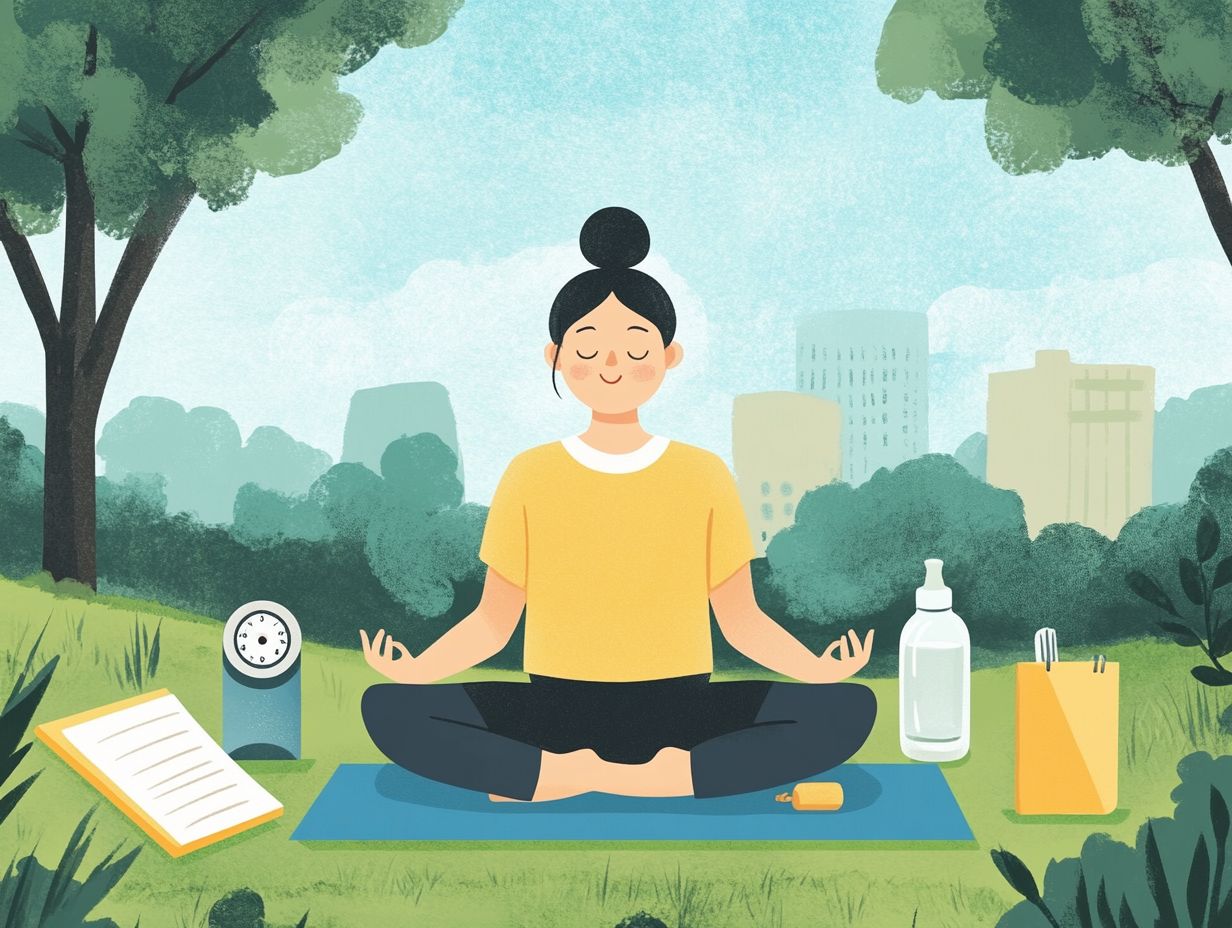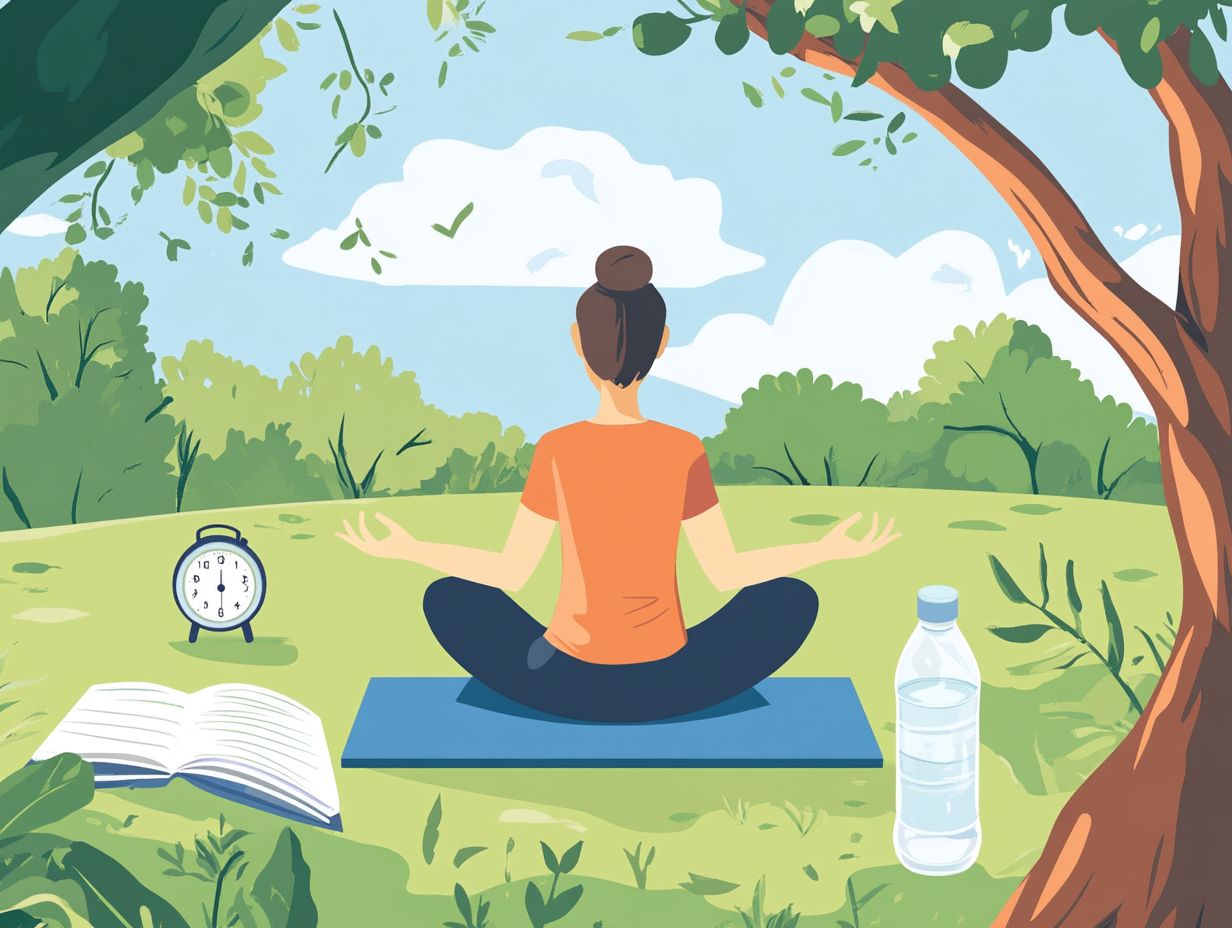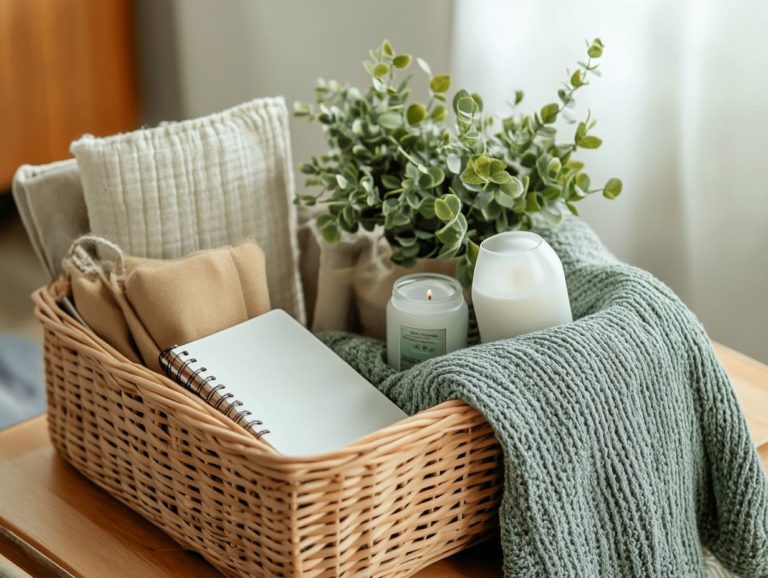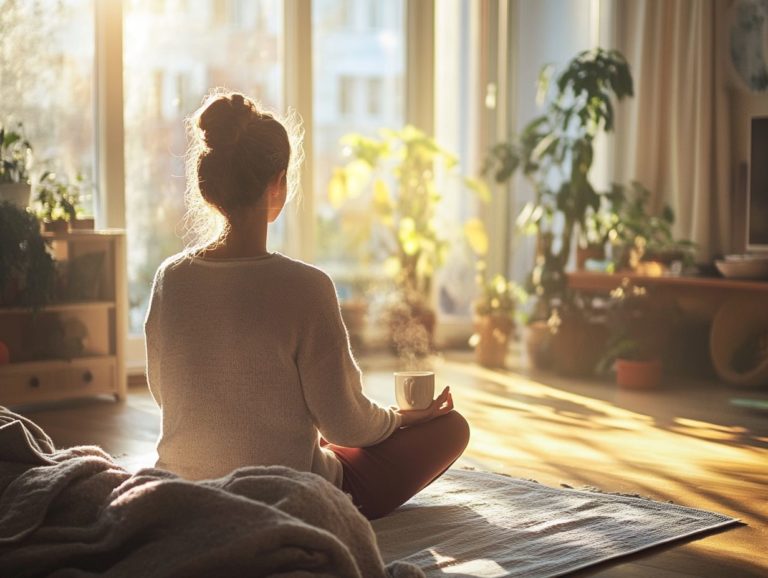5 Quick Self-Care Exercises for Busy Days
Contents
- Embrace Self-Care: Quick Practices for Busy Days
- The Importance of Self-Care
- Frequently Asked Questions
- Curious about self-care exercises? What are self-care exercises?
- Why is it important to do self-care exercises on busy days?
- What are 5 quick self-care exercises for busy days?
- How often should I do self-care exercises on busy days?
- Can self-care exercises be tailored to my specific needs?
- What if I don’t have time for self-care exercises on busy days?
Embrace Self-Care: Quick Practices for Busy Days
In the whirlwind of your fast-paced life, self-care often gets relegated to the back burner, especially on those hectic days when time seems to slip through your fingers. Yet, prioritizing your well-being is essential for maintaining both your mental and emotional health. A healthy lifestyle that includes regular self-care practices can help manage anxiety and prevent burnout.
You can incorporate five quick and effective self-care exercises that seamlessly fit into even the most demanding schedules. Whether it s a brief stroll outside, taking an outdoor hike, or indulging in your favorite music, these simple practices can refresh your spirit and empower you to tackle your day with renewed vitality.
You will discover the significance of self-care, explore additional quick ideas, and debunk common myths surrounding this critical aspect of well-being. Embrace the journey of making self-care a manageable and fulfilling part of your daily routine! Engaging in activities like a mindfulness walk or a yoga class can enhance your daily self-care routine.
Key Takeaways:

- Taking a 5-minute walk outside can help clear your mind and boost your energy levels on busy days. This quick self-care practice can also promote a positive mindset.
- Practicing deep breathing and other breathing exercises can help reduce stress and improve focus when you’re feeling overwhelmed.
- Listening to your favorite song can instantly uplift your mood and provide a quick break from a hectic day. It’s an excellent way to integrate relaxation techniques into your routine.
1. Take a 5-Minute Walk Outside
Taking just five minutes for a walk outside can be a remarkable self-care strategy. This brief escape not only promotes your physical health but also nurtures your mental well-being, allowing you to connect with nature and reduce stress while clearing your mind. In doing so, you enhance your emotional resilience and coping mechanisms.
These short yet refreshing outdoor experiences invigorate your body, boost your energy levels, and improve circulation, all while playing a crucial role in elevating your mood. Engaging with the sights and sounds of nature serves as a natural stress reliever and a mindfulness practice, helping you remain present and truly appreciate your surroundings.
By incorporating these quick bursts of physical activity into your daily routine, you cultivate essential self-care habits that create a sense of calm and balance amidst life s chaos. This, in turn, enables you to focus better and enhances your productivity throughout the day. Consider adding a nature connection to your routine for added benefits!
2. Practice Deep Breathing
Practicing deep breathing stands out as an exceptional self-care technique that significantly enhances relaxation and mindfulness. This method not only helps reduce stress but also promotes emotional well-being through straightforward exercises centered on breath control and awareness.
Among these techniques, diaphragmatic breathing invites you to engage your diaphragm, allowing for deeper, more restorative breaths that lower your heart rate and increase oxygen flow. Alternatively, box breathing offers a structured approach with its sequence of inhalation, hold, exhalation, and pause, creating a soothing rhythm that elevates mental clarity and focus while effectively reducing anxiety levels.
By integrating these practices into your daily routine whether through guided sessions in the morning or brief pauses throughout your workday you can significantly bolster your mental resilience and cultivate a profound sense of calm. These techniques become invaluable tools in your self-care arsenal, empowering you to navigate life s challenges with grace!
3. Listen to Your Favorite Song
Listening to your favorite song can transform into a joyful self-care ritual. It offers profound emotional health benefits by lifting your spirits, alleviating stress, and nurturing a positive mindset through the enchanting power of music and personal connection.
This transformative experience emerges from the effect on your mind that melodies and lyrics can exert on you. Music often acts as an emotional anchor during life s storms. Research from institutions like the National Institute of Mental Health indicates that music can spark the release of dopamine, a chemical in your brain that makes you feel happy, enhancing your sense of happiness and relaxation.
To fully embrace these benefits, curate personalized playlists. These playlists should uplift you and resonate with your experiences. By including tracks that evoke treasured memories or inspire hope, you can create a comforting soundtrack for the inevitable challenges life throws your way. Allow music to thrive as a powerful coping mechanism in the face of adversity.
4. Write in a Journal

Writing in a journal is a deeply enriching self-care practice that invites you to embark on a journey of self-reflection. It bolsters your emotional resilience and fosters mental clarity. Journaling offers a sacred space where you can freely express your thoughts and feelings on paper. Regular journaling sessions can be a powerful tool for maintaining your emotional health.
This practice is not merely a way to document daily events; it serves as a vital tool for tracking your emotional well-being over time. By committing to regular journaling, you can effectively navigate stressors and unpack challenging emotions. This will give you valuable insights into your mental state.
Incorporating gratitude practices, such as jotting down lists of what you’re thankful for, cultivates a positive mindset. It shifts your focus from negativity to appreciation. Various techniques, like using prompts for self-discovery or diving into free writing to explore your feelings, can significantly enhance your self-awareness.
Ultimately, these methods give you the power to traverse your inner landscape. This nurtures both personal growth and emotional health along the way. Start journaling tonight!
5. Do a Quick Stretching Routine
Engaging in a quick stretching routine is an exceptional self-care practice. It enhances your physical health and alleviates tension, ultimately promoting your overall well-being through increased flexibility and relaxation. Consider incorporating a body scan or self-massage techniques to further benefit your physical and mental health.
These stretches fit easily into your daily routine, whether at home or in the office. They offer immediate relief from the physical and mental strain that tends to accumulate throughout the day. Simple movements like neck rolls, shoulder shrugs, and wrist stretches can be completed in mere minutes. They foster a sense of calm while simultaneously boosting your energy levels.
By incorporating elements of yoga such as deep breathing and gentle poses you can elevate the benefits of stretching. This creates a more holistic approach to self-care that marries physical activity with mindfulness. Experience the amazing benefits of this powerful combination it relieves stress and nurtures a balanced mind-body connection, which is essential for maintaining focus and overall health.
Why Is Self-Care Important, Especially on Busy Days?
Self-care is absolutely essential, especially on those hectic days when life seems to demand everything from you. It serves as vital support for maintaining your mental health and physical well-being, enabling you to manage stress effectively and bolster your emotional resilience.
By incorporating regular self-care practices into your routine, you can recharge emotionally and physically, cultivating a greater sense of balance in your life. When you prioritize your own needs, you’ll often discover that it enriches your relationships with supportive family members and friends. This allows for deeper connections rooted in understanding and care. Community care and social connections also play essential roles in fostering overall well-being.
Investing in self-care helps reduce stress and promotes personal development and self-awareness. This empowers you to recognize your feelings more clearly and respond to life’s pressures with poise. Embracing this well-rounded strategy can transform chaotic days into invaluable opportunities for growth and meaningful connection. Practicing positive affirmations and effective communication can further enhance your self-care routine.
Quick and Easy Self-Care Ideas
In addition to the practices mentioned, you ll find a wealth of quick self-care ideas that you can seamlessly weave into your daily routine to uplift your emotional well-being, enhance relaxation, and foster healthy habits. Incorporating creative outlets and time management strategies can also contribute to a comprehensive self-care toolbox.
Consider exploring gratitude practices; they can help shift your focus from stress to appreciation, creating a positive ripple effect on your mental health. Keeping a gratitude list can further enhance these benefits. Engaging in mindfulness walks not only serves as a form of physical exercise but also cultivates a deeper connection with the present moment, allowing you to savor life as it unfolds.
Self-massage techniques, which involve using your hands to relieve muscle tension, can be incredibly effective, offering much-needed relief from tension and promoting an overall sense of relaxation. It s essential to recognize that embracing variety in your self-care practices enables you to discover what truly resonates with you, paving the way for a customized approach that aligns with your personal strengths and preferences.
By blending these strategies, you can craft a self-care routine that is not only fulfilling but also adaptable to your evolving needs.
How Can Daily Self-Care Improve Overall Well-Being?

Daily self-care practices have the potential to significantly enhance your overall well-being by encouraging a healthy lifestyle, boosting emotional resilience, and providing effective stress relief. This, in turn, leads to elevated energy levels and clearer mental faculties. Activities such as meditation, journaling sessions, and eating healthy snacks can also contribute to a balanced self-care routine.
By incorporating simple yet powerful routines like mindfulness meditation, regular physical activity, and adequate sleep you can create a snowball effect that positively influences both your mental and physical health. Research from the National Institute of Mental Health indicates that individuals who prioritize self-care tend to report lower levels of anxiety and depression, clearly showcasing the therapeutic benefits of such practices.
Consistency in these routines not only helps you build positive habits but also nurtures a sense of accomplishment and self-worth. Many who have embraced self-care share their experiences of greater emotional stability and improved relationships, highlighting how even small daily efforts can yield transformative long-term benefits.
The Importance of Self-Care
What Are the Consequences of Not Prioritizing Self-Care?
Neglecting self-care can have profound consequences, such as burnout, increased anxiety, and depression. These effects can adversely affect your emotional health and overall quality of life.
Research shows that individuals who frequently overlook their well-being are more vulnerable to serious mental health challenges. For example, a study by the American Psychological Association reveals that ongoing stress without any self-care interventions can lead to cognitive decline and emotional instability.
Experts underscore the importance of personal reflection. Identifying your strengths can act as a protective buffer against the negative effects of stress. Seeking community support not only nurtures connections but also grants you access to resources that enhance resilience and emotional stability. This significantly lowers the risk of mental health crises.
How Can One Incorporate Self-Care into Their Daily Routine?
Incorporating self-care into your daily routine is essential for cultivating healthy habits and fostering personal growth. This can be seamlessly achieved through thoughtful time management and intentional planning.
To effectively prioritize self-care, start by evaluating your current daily routines. Identify activities that can be adjusted or eliminated to create space for relaxation and mindfulness.
Scheduling dedicated time for practices like meditation, gentle yoga, or even a brief stroll can be truly transformative. By treating these self-care sessions as important appointments, you reinforce their significance in your life.
Consider setting reminders on your phone or using a planner to carve out time for these activities. This simple step makes it easier to commit to prioritizing your well-being, even amidst the demands of a busy schedule.
What Are Some Common Self-Care Myths and Misconceptions?
There are numerous myths and misconceptions about self-care that may prevent you from fully embracing these vital practices for your emotional well-being and self-compassion.
You might think that self-care is a luxury reserved for those with endless free time or that focusing on your own needs is inherently selfish. Such beliefs can be quite harmful, as self-care is crucial for maintaining balance in your life and nurturing healthy relationships.
When you take the time to recharge and care for yourself, you enhance your ability to support your friends, family, and community. This approach not only fortifies your emotional resilience but also deepens your connections and fosters a sense of belonging. This creates a positive ripple effect that benefits everyone around you.
Frequently Asked Questions

Curious about self-care exercises? What are self-care exercises?
Self-care exercises are activities that help promote mental, emotional, and physical well-being. They are designed to reduce stress, increase relaxation, and improve overall health.
Why is it important to do self-care exercises on busy days?
Busy days can be overwhelming and exhausting, making it difficult to find time for self-care. However, taking a few minutes to do self-care exercises can help reduce stress, increase focus, and improve productivity.
What are 5 quick self-care exercises for busy days?
- Deep breathing: Take a few deep breaths in through your nose and out through your mouth. This can help reduce stress and increase relaxation.
- Stretching: Stand up and stretch your arms, legs, and neck. This can help release tension and improve circulation.
- Mindful walking: Take a short walk outside and focus on your surroundings. This can help clear your mind and improve mood.
- Positive affirmations: Repeat positive statements to yourself, such as “I am capable” or “I am enough.” This can help boost self-confidence and improve self-esteem.
- Gratitude journaling: Write down things you are grateful for, even on busy days. This can help shift your focus to the positive and improve overall well-being.
How often should I do self-care exercises on busy days?
It is recommended to do self-care exercises at least once a day, even on busy days. If possible, try to incorporate multiple short self-care breaks throughout the day to help maintain a sense of calm and balance.
Can self-care exercises be tailored to my specific needs?
Yes, self-care exercises can be customized to fit your needs. Experiment with different activities to discover what works best for you.
What if I don’t have time for self-care exercises on busy days?
Even on busy days, prioritizing self-care is essential for your well-being! If you’re short on time, try simple methods like deep breathing while waiting in line or listening to a guided meditation during your commute. You can also take a moment to stretch your arms or take a few deep breaths to recharge.






